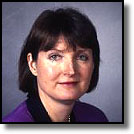"Things Can Only Get Better" For Women In Parliament
Equal rights campaigners have welcomed the record number of women MPs elected to the Commons but some warned against complacency.
The Labour frontbencher Harriet Harman said the election, which took the total
number of women MPs to around 120, "heralds a new style of government with a
tremendous step forward for women".
The Director of the Fawcett Society, which campaigns for equal representation for women in Parliament, stressed that the number of women in Parliament would need to more than double again to equal the number of men in the Commons. Shelagh Diplock called for "lasting change" which would go beyond the opportunities created in "marginal seats with big swings".
Ms Diplock said: "The majority of the new women MPs have come in marginal
seats with big swings and that means that if, as inevitably will happen, there's a big swing back they will lose their seats." But she believed the increased number of women MPs would be a "major factor in bringing about a new kind of politics which the voters were clearly looking for".
"There are more women in this Parliament than the total number of women who have ever represented seats across the whole of the history
of the Commons," claimed Ms Harman. She added, "We are going to have to see more mothers in the Mother of Parliaments. They are going to be a real new force in British politics."
Ms Harman came in for personal criticism in the past from some Labour colleagues for pushing for more representation for women in the party.
But she argued today: "It is good news for democracy because women in the
country will see women in Parliament. It will drive to the forefront of the political agenda a whole range of issues like child care, like opportunities for women at work, the balance between work and home. These will come to the forefront of the political agenda."
Ms Harman said there were some "exceptional" individual women with strong
track records and performances in local government and other areas who had been
elected to the Commons for the first time. But the Fawcett Society was more cautious about the long-term impact the new female faces in the Commons would make. Ms Diplock said: "It does remain to be seen how quickly the women can make an impact, but I think that what we feel is that the electorate...were actually looking for a new kind of politics."
And the Royal College of Midwives has warned the new government that now the election was over it was "time to get back to work". The general secretary Karlene Davis said: "The new Government must realise that women want a better deal. "Maternity services are under threat across the country, and there is a
crisis in recruitment and retention of midwives which the government must tackle immediately."
|

